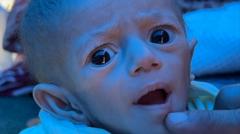In the devastated landscape of Gaza, a haunting reality unfolds as children endure the daily trauma of hunger and helplessness. In a world stripped of joy, the innocent faces of children, like that of five-month-old Siwar Ashour, show the brutal toll that prolonged conflict and the Israeli blockade have on the youngest members of society. As they wait in lines for meager food rations, these children appear oblivious to the camera's presence, having long accepted a life overshadowed by death and destruction.
The situation has escalated markedly since the renewed Israeli offensive began, thrusting families deeper into despair. A local cameraman, who has witnessed the heartbreak of families unfolding amidst the rubble, has taken it upon himself to find the little girl whose malnutrition had deeply affected him. Siwar, born into this chaos, weighs just a fraction of what is normal for her age, indicating the severe lack of adequate nutrition and care.
Recently discharged from Nasser hospital, Siwar has returned home, where her mother, Najwa, and grandmother, Reem, grapple with the daily struggle of finding the specialized formula required for the baby’s allergies. In war-torn conditions, they cannot afford the essentials—especially with the blockade limiting aid. Najwa shares her deflation as supplies dwindle and flies swarm around Siwar, amplifying the family's desperate fight against the combined perils of malnutrition and an unhygienic living environment.
The impact of the war stretches beyond Siwar, as countless mothers find it increasingly difficult to breastfeed, reflecting the broader crisis of food scarcity and contaminated water. Najwa herself endured malnutrition during her pregnancy, and the struggle for her family’s survival seems Sisyphean. As the brutality of war punctuates their days, Najwa reflects on a despairing yet clear truth: life’s simplest necessities—food and clean water—are now unattainable luxuries.
Despite claims from Israeli military authorities denying food shortages, aid organizations, the United Nations, and the international community continue to speak against this narrative. Reports from the UN highlight excessive militarization in Gaza and the dire humanitarian conditions as an overwhelming majority of its population is left struggling under oppression.
As Najwa ponders the uncertainty of daily existence, she emphasizes living solely in the present moment—a trend echoed among many in Gaza. With 2.1 million inhabitants enduring unthinkable suffering, their survival hangs precariously in the balance as the world’s eyes remain focused on the unfolding tragedy.
The cycle of suffering continues as conflicts persist, and for families like Najwa's, each day is a relentless battle to secure lifesaving resources, underscoring the urgent need for a collective humanitarian response.
The situation has escalated markedly since the renewed Israeli offensive began, thrusting families deeper into despair. A local cameraman, who has witnessed the heartbreak of families unfolding amidst the rubble, has taken it upon himself to find the little girl whose malnutrition had deeply affected him. Siwar, born into this chaos, weighs just a fraction of what is normal for her age, indicating the severe lack of adequate nutrition and care.
Recently discharged from Nasser hospital, Siwar has returned home, where her mother, Najwa, and grandmother, Reem, grapple with the daily struggle of finding the specialized formula required for the baby’s allergies. In war-torn conditions, they cannot afford the essentials—especially with the blockade limiting aid. Najwa shares her deflation as supplies dwindle and flies swarm around Siwar, amplifying the family's desperate fight against the combined perils of malnutrition and an unhygienic living environment.
The impact of the war stretches beyond Siwar, as countless mothers find it increasingly difficult to breastfeed, reflecting the broader crisis of food scarcity and contaminated water. Najwa herself endured malnutrition during her pregnancy, and the struggle for her family’s survival seems Sisyphean. As the brutality of war punctuates their days, Najwa reflects on a despairing yet clear truth: life’s simplest necessities—food and clean water—are now unattainable luxuries.
Despite claims from Israeli military authorities denying food shortages, aid organizations, the United Nations, and the international community continue to speak against this narrative. Reports from the UN highlight excessive militarization in Gaza and the dire humanitarian conditions as an overwhelming majority of its population is left struggling under oppression.
As Najwa ponders the uncertainty of daily existence, she emphasizes living solely in the present moment—a trend echoed among many in Gaza. With 2.1 million inhabitants enduring unthinkable suffering, their survival hangs precariously in the balance as the world’s eyes remain focused on the unfolding tragedy.
The cycle of suffering continues as conflicts persist, and for families like Najwa's, each day is a relentless battle to secure lifesaving resources, underscoring the urgent need for a collective humanitarian response.















